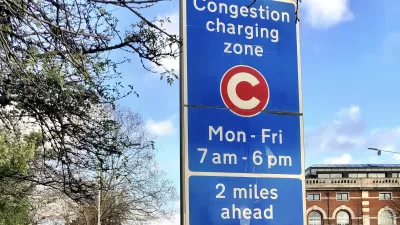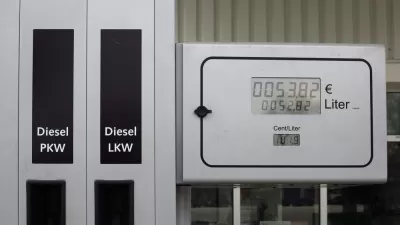Unusually mild and dry weather in much of Italy has worsened air quality so much that city governments are acting to reduce emissions from one of the chief sources of air pollution by enacting odd-even license restrictions on driving.
Following the example set by Madrid last month and Paris in March, Italian cities are looking to curb driving and incentivize transit usage as a means to cope with unhealthy levels of air pollution.
"An unusually long period of stable weather with little rain or wind has driven air pollution levels to record highs in Italy and prompted emergency measures in a number of cities," writes Gaia Pianigiani for The New York Times in Rome. “(H)igh concentrations of particulate matter and nitrogen dioxide (NOx) continue, aggravated by the weather situation of high pressure and absence of wind,” the city government said.
But many argue that whatever the weather, Italy needs to get better control over the heavy traffic choking its cities and the emissions from home heating systems that are scarcely monitored by the authorities.
Pianigiani describes the driving restrictions and transit benefits that municipal governments will enact because of the high pollution levels. Air quality is not anticipated to improve because of the lingering high atmospheric pressure weather pattern.
- In Milan, Italy's second largest city, "the city government’s decision on Wednesday (Dec. 23) to restrict traffic between 10 a.m. and 4 p.m. for three days next week made headlines and raised health concerns. [More on Milan's congestion cordon charge below.]
- In Rome, the special commissioner who is acting as mayor said Thursday that car traffic in the city would once again be limited next Monday and Tuesday in the early morning and late afternoon, based on the last digits of license plate numbers, while single-ride tickets on the city’s transit system would become passes valid all day.
- In the northwestern city of Turin (pop. 911,823), public transportation was free for two days this month to encourage commuters to leave their cars at home.
As in other cities such as Delhi where diesel cars are singled-out because of their higher emissions, Milan's auto restrictions are confined to diesel cars.
Nicola Pirrone, director of the Institute of Atmospheric Pollution Research at Italy’s National Research Council, described episodic measures such as "blocking traffic for one or two days" and odd-even license plate driving restrictions, as "merely palliative".
One example of a policy change would be to follow Madrid's example of charging more for polluting cars and allowing electric vehicles to park for free.
Arguably a more effective policy of reducing traffic and auto emissions was implemented in 2008 in the form of a congestion cordon charge. A revised version was lifted after only six months due to a judge's ruling on a lawsuit brought by a garage owner, described in an August 2012 post.
Eric Jaffe of CityLab writes that when the 2012 cordon charge was halted for eight weeks, the effect was immediate—traffic returned as soon as the charge was waived, "no lag period." The charge had reduced emissions "from 6 to 17 percent."
The editor of Eltis describes the the two pricing schemes applied to "AREA C" in Milan since 2008. Ironically, the early scheme, Ecopass, is described as a pollution charge.
As noted in earlier this month, keeping the focus on air quality presents an effective strategy to reduce driving, even if it be episodic-based, as Mayor Anne Hidalgo of Paris implemented last month.
FULL STORY: Italy, Dirty Air at Record Levels, Is Putting Limits on Traffic

Alabama: Trump Terminates Settlements for Black Communities Harmed By Raw Sewage
Trump deemed the landmark civil rights agreement “illegal DEI and environmental justice policy.”

Study: Maui’s Plan to Convert Vacation Rentals to Long-Term Housing Could Cause Nearly $1 Billion Economic Loss
The plan would reduce visitor accommodation by 25% resulting in 1,900 jobs lost.

Planetizen Federal Action Tracker
A weekly monitor of how Trump’s orders and actions are impacting planners and planning in America.

Wind Energy on the Rise Despite Federal Policy Reversal
The Trump administration is revoking federal support for renewable energy, but demand for new projects continues unabated.

Passengers Flock to Caltrain After Electrification
The new electric trains are running faster and more reliably, leading to strong ridership growth on the Bay Area rail system.

Texas Churches Rally Behind ‘Yes in God’s Back Yard’ Legislation
Religious leaders want the state to reduce zoning regulations to streamline leasing church-owned land to housing developers.
Urban Design for Planners 1: Software Tools
This six-course series explores essential urban design concepts using open source software and equips planners with the tools they need to participate fully in the urban design process.
Planning for Universal Design
Learn the tools for implementing Universal Design in planning regulations.
Caltrans
Smith Gee Studio
Institute for Housing and Urban Development Studies (IHS)
City of Grandview
Harvard GSD Executive Education
Toledo-Lucas County Plan Commissions
Salt Lake City
NYU Wagner Graduate School of Public Service





























